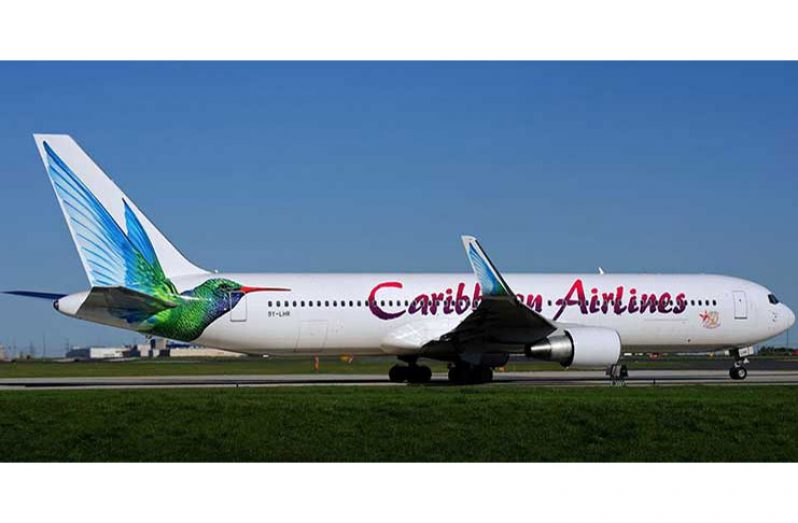THE Competitions and Consumer Affairs Commission (CCAC), in a recent study, highlighted that Guyana continues to be exploited as “cash cow” for Trinidad state- owned Caribbean Airlines Limited (CAL) so that the struggling airline can offset huge losses being encountered at its internal air bridge route between Trinidad and Tobago.
The study released on Monday called, “Competition in International Airline Routes: A Study of the International Airline Sector in Guyana” contends that “revenues from Guyana are used, in essence, to subsidized Trinidadians’ travel between Trinidad and Tobago”.
“CAL kept prices in Guyana artificially high due to its monopoly to increase prices to offset the Port of Spain/Tobago air bridge that has financially hemorrhaged the airline,” the report asserts.
Operating more than 600 weekly flights to 19 destinations in the Caribbean, North and South America, and in Guyana, CAL operates seven weekly return flights to Miami, seven weekly return flights to Pearson International Airport in Canada and 10 weekly return flights to the John F. Kennedy Airport in New York.
Guyanese have continuously complained, over the years, of the exorbitant prices charged by the regional airline carrier, coupled, at times, with less than stellar service meted out to customers. The label “cash cow” was, according to news reports, used in 2017 by Trinidadian Member of Parliament, Fazal Karim, to describe the airlines operations in Guyana, at a time when it was now beginning to become profitable and ceasing to be a burden to the Trinidadian taxpayers.
Currently, the airline accounts for 59 percent market share of air traffic at the CJIA. The Guyana to John F. Kennedy Airport in New York route is the airline’s most lucrative route, with travel through this route accounting for 34 percent of the traffic passing through the Cheddi Jagan International Airport (CJIA). The next most popular route, Canada, accounts for only 15 percent of travel through the airport; Aruba accounts for 14 percent.
The study did not include data from the Eugene F. Correia International Airport and forms part of a larger document which seeks to examine Guyana’s airline industry in its entirety.
The study calls for the need of a Guyanese state-owned airline to “temper this monopoly” which CAL exploits. The airline experienced an average of the 78.35 percent seat capacity from 2008-2018. Notwithstanding, the prices remain high.
The study explains that the airline makes a loss of approximately US40 per passenger for its Trinidad to Tobago air bridge route, with the loss being significantly magnified given the fact that that route accounts for more than 50 percent of CAL’s air traffic.
“The route is responsible for an estimated US$40, 000,000 loss to the company annually. The price of a round trip on the Tobago air bridge route is US$60. The fare has been kept artificially down, the actual cost is… around $120, [and] the airline gets a subsidy of 20 dollars per passenger per trip, hence the loss on this route is $40 per passenger. This route accounts for more than one million passengers,” the study notes.
And Guyanese continue to pay for it. The study notes that, in terms of profit, CAL ‘milks’ as much as 100 percent on a return trip and 150 percent on a one-way trip for peak travelling from its Guyana to JFK route.
“At no time will CAL reap less than 97percent and 76 percent profit respectively. The returns are of course significantly higher, when tickets aren’t purchased early for the peak season. A typical basic non-flexible economy one-way flight, booked months in advance, for the peak season of July-August costs $553. 11 while a return costs $940. 65,” the report revealed.
The report provides calculations that places the airlines break-even cost per seat at US$297.64 one way and US$595.28 return, using maximum costing estimates.
“The minimum load capacity that CAL requires to break even on this flight on only their basic economy non flex price is 64 seats, a capacity of only 40 percent.”
The Commission noted being compelled to conduct the study due to the lack of reasonably-priced and reliable international air travel in a time of increased global competition has –
“[It] prompted us to examine the industry to ascertain how we can promote competition.
Given the international traffic to and from Guyana in relation to its population, it is imperative that for all parties involved that international travel to Guyana by air remains a competitive affair,” the study said.
Mistreatment of Guyanese by state-owned Trinidadian airlines dates all the way back to the 1980s when it was known as British West Indies Airlines. CAL was incorporated on September, 2006, and began flight operations in January, 2007.
The study underscores that the situation of Guyanese is compounded by Guyana’s lack of alternatives, which “completely eroded any consumer power”.
“In an ideal market, customers would also have other travel options to consider such as high-speed trains, cars, ships, and buses. This isn’t the case for Guyana and its GEO-JFK market. They are no substitutes for this market; we cannot get there by car, bus or boats,”
The study notes that the Guyana’s airline market is not susceptible to market factors that usually drive the cost down, particularly increase in competition. It notes the example of the lack of changes in price even after American Airlines entered the Guyana market in November, 2018, catering for flights between Guyana and the US.
“Guyana had hoped prices would be driven down. This hope never materialized,” the report noted.
The study goes on to reference American Airlines as being on its own exploitation mission, targeting mainly employees and others related to the oil exploration operations currently ongoing in Guyana, further burdening Guyana, given that the country is responsible for oil exploration expenses, including those for travel and accommodation.



.jpg)









